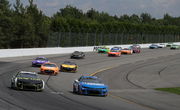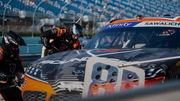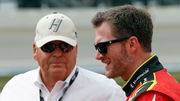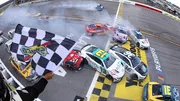
USA Today via Reuters
Mar 27, 2022; Austin, Texas, USA; NASCAR Cup Series driver Ty Dillon (42) before the start of the EchoPark Automotive Texas Grand Prix at Circuit of the Americas. Mandatory Credit: Mike Dinovo-USA TODAY Sports

USA Today via Reuters
Mar 27, 2022; Austin, Texas, USA; NASCAR Cup Series driver Ty Dillon (42) before the start of the EchoPark Automotive Texas Grand Prix at Circuit of the Americas. Mandatory Credit: Mike Dinovo-USA TODAY Sports
After a disappointing P24 finish at Richmond—a track where Austin Dillon has usually done well—it was clear something wasn’t clicking over at Richard Childress Racing [RCR]. Early in April, the team decided it was time for a shake-up and switched out the crew chief for the No. 3 Chevy. This change seemed to spark a bit of a comeback, as Dillon managed a top-10 finish at Texas. However, this positive shift wasn’t enough to dodge another setback—this time, a crew member from his team faced an indefinite suspension from NASCAR.
The pit crews are under the spotlight for all the wrong reasons this week
After the races at Texas Motor Speedway, the NASCAR penalty report was loaded with infractions—eight suspensions in total. But the one that really made waves was the indefinite suspension handed down to Nicholas Covey, a pit crew member for Austin Dillon’s team who once was part of Dale Earnhardt Jr’s crew, for a substance abuse policy violation. Covey, who was working as the jackman for the No. 3 Richard Childress Racing [RCR] Chevy, got suspended indefinitely under Sections 4.1 & 10.1.A of the NASCAR rule book. His suspension stems from activities as recent as the Martinsville race on April 7.
ADVERTISEMENT
Article continues below this ad
NASCAR got serious about its drug policy in 2009, shifting from a suspicion-based testing system to a weekly random drug testing regime that includes drivers, crew members, and officials. The list of no-gos under this policy includes a variety of stimulants like amphetamines, meth, ecstasy, and other related substances. Richard Childress Racing’s crew chief, Nicholas Covey’s suspension specifics haven’t been disclosed, including whether it was due to narcotics, stimulants, benzodiazepines, barbiturates, performance enhancers, sleep aids, beta-blockers, or even alcohol.
NASCAR’s strict stance extends to mixing substances too. They point out that even seemingly harmless actions—like downing a bunch of espressos, popping some cold meds, and then taking a sleep aid—can become a safety hazard on the track, even though individually, these might not be a big deal.
Well, while Nick Covey’s NASCAR career hit a bump with his indefinite suspension for a substance abuse policy violation, this doesn’t necessarily spell the end of the road for him. Under NASCAR’s doping rules, after a positive test for a banned substance, the person is benched indefinitely. To make a comeback, the RCR crew chief will need to navigate NASCAR’s Road to Recovery Program, which involves a plan approved by the authorities including treatment, rehab, counseling, and steps to ensure such incidents don’t repeat. So, if Covey sticks to the recovery path laid out by NASCAR, he might just find his way back to the pit road.
NASCAR also announced an indefinite suspension for Austin Dillon jackman Nick Covey for a violation of the substance-abuse policy. RCR replaced Covey with Garrett Crall last week at Texas. https://t.co/AYFlS1b9Xq
— Bob Pockrass (@bobpockrass) April 16, 2024
ADVERTISEMENT
Article continues below this ad
Not to mention, NASCAR has definitely been enforcing its substance abuse policy more strictly and not playing around when it comes to safety and sobriety, resulting in the suspension of a significant number of drivers and crew chiefs recently.
Trending
NASCAR drivers and crew chiefs who received suspensions for substance abuse
- Before Nicholas Covey’s recent headline, there were many other notable cases within NASCAR’s stringent substance abuse policy. Take Todd Parrott, Aric Almirola‘s crew chief, who got suspended for testing positive for an undisclosed substance back in 2013.
- Then in 2019, driver Bayley Currey faced an indefinite suspension before what would have been his tenth NASCAR Cup Series start at Bristol Motor Speedway. DMHA (2-Amino-5-methylhexane) was found in one of his pre-workout supplements; he admitted to taking it.
- Another incident involved Germain Racing’s Matt Borland, crew chief for Ty Dillon, who tested positive for a banned substance, methylhexanamine, aka DMAA, which he unknowingly consumed in diet coffee. Despite this setback, Germain Racing stood by him, supporting his return after completing the Road to Recovery program.
- Back in 2012, A.J. Allmendinger got suspended just hours before the Coke Zero 400 for a failed drug test, with NASCAR swiftly enforcing a temporary suspension. Allmendinger had a brief window to challenge the findings with a “B” test.
ADVERTISEMENT
Article continues below this ad
- Going further back to 2009, Jeremy Mayfield’s career took a dramatic turn when he tested positive for methamphetamine, marking his second offense. His legal battle ended with a federal appeals court upholding his suspension, effectively barring him from NASCAR.
Do you have any more names or stories to add to this list of NASCAR’s substance policy run-ins? Drop them in the comments!
ADVERTISEMENT
ADVERTISEMENT
ADVERTISEMENT
ADVERTISEMENT






